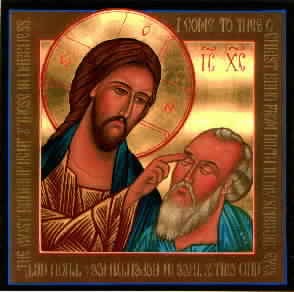 This Sunday’s reading came from Mark 10, and it told about Bartimaeus. This story always reminded me of that famous comedic shtick: “I once knew a man who was so poor,” to which an audience member would yell out, “how poor was he?!” In the cause of poor Bartimaeus, it seems he was so poor he couldn’t even afford a name!
This Sunday’s reading came from Mark 10, and it told about Bartimaeus. This story always reminded me of that famous comedic shtick: “I once knew a man who was so poor,” to which an audience member would yell out, “how poor was he?!” In the cause of poor Bartimaeus, it seems he was so poor he couldn’t even afford a name!
As Jesus was leaving Jericho with his disciples and a sizable crowd, Bartimaeus, a blind man, the son of Timaeus, sat by the roadside begging.
See, Jesus and his disciples spoke Aramaic, and in Aramaic, “bar” is a prefix which means “son of.” We can see this in places like Matthew 16, when Simon professes to Jesus that He is “the Christ, the Son of the living God,” Jesus blesses, him, saying “Blessed are you, Simon Barjonah”, or as it’s sometimes rendered, “Simon, son of Jonah” or “Simon, son of John” (John being the derivative name from Jonah.) Barjonah simply means, “son of Jonah.”
Or consider this interesting passage from Matthew 27:17
So when they had assembled, Pilate said to them, “Which one do you want me to release to you, Jesus Barabbas, or Jesus called Messiah?”
Pilate gave the people a choice between a man named “Jesus” who is called “Barabbas” which is translated literally as “son of the father,” and Jesus, who is truly the son of the father, but here differentiated through the Hebrew term for anointed (christos in Greek, of course).
So the poor beggar, “Bartimaeus”, also known as “the Son of Timaeus” seems to have been so poor as to have not warranted a name of his own! He’s “The son of Timaeus,” also known as the son of Timaeus. He’s so poor he’s only known by his relation to his father.
But…
The funny thing is, depending on how Timaeus is translated (as Greek, “Timaeus”, or as the Aramaic “teymah”), this passage could have a further, particularly interesting significance.
On the one hand, in Greek, the name Timaeus calls to mind the famous dialog of Plato of the same name, which speaks of the creation of the world and it’s ordered beauty, focusing on the beauty of the eyes no less. Jowett gives this translation of the relevant passage.
And of the organs they first contrived the eyes to give light, and the principle according to which they were inserted was as follows: So much of fire as would not burn, but gave a gentle light, they formed into a substance akin to the light of every-day life; and the pure fire which is within us and related thereto they made to flow through the eyes in a stream smooth and dense, compressing the whole eye, and especially the centre part, so that it kept out everything of a coarser nature, and allowed to pass only this pure element. When the light of day surrounds the stream of vision, then like falls upon like, and they coalesce, and one body is formed by natural affinity in the line of vision, wherever the light that falls from within meets with an external object. And the whole stream of vision, being similarly affected in virtue of similarity, diffuses the motions of what it touches or what touches it over the whole body, until they reach the soul, causing that perception which we call sight. But when night comes on and the external and kindred fire departs, then the stream of vision is cut off; for going forth to an unlike element it is changed and extinguished, being no longer of one nature with the surrounding atmosphere which is now deprived of fire: and so the eye no longer sees, and we feel disposed to sleep. (SOURCE)
If you can get past the ancient biology, one can appreciate what Plato was doing (more on that in a future post).
Of course, given the semitic origin of “bar-” in Aramaic, we can also look to the Aramaic translation of the full name, Bar-Timaeus, which gives us “bar-teymah”, which can be translated as, ironically, “the son of Poverty.”
So now our poor beggar is so poor, not only does he not get his own name, but even his father’s name means poverty! He is the son of poverty.
And of course, this encounter of the son of poverty with Christ ends thus:
Jesus stopped and said, “Call him.” So they called the blind man, saying to him, “Take courage; get up, he is calling you.” He threw aside his cloak, sprang up, and came to Jesus. Jesus said to him in reply, “What do you want me to do for you?” The blind man replied to him, “Master, I want to see.” Jesus told him, “Go your way; your faith has saved you.” Immediately he received his sight and followed him on the way. (Mark 10:49-52)
Unlike the rich man from a few verses earlier, who “went away sad, for he had many possessions,” once he had asked Christ what he must do to follow him, Bartimaeus give up the only thing he has, tossing aside his cloak and readily following Christ (cf. Mark 10:17-30).
Would that we could be like him!